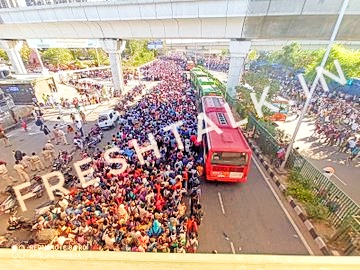A nationwide lockdown in India – the world’s largest – over the coronavirus pandemic is wreaking havoc on thousands of migrant workers in the capital, New Delhi.
New Delhi: Taking tough action against officers for failing to enforce the Centre’s guidelines on containment of Covid-19 by allowing thousands of migrant workers to congregate in large numbers at Anand Vihar ISBT in violation of the lockdown, the home ministry on Sunday initiated disciplinary proceedings against four Delhi government officers for “dereliction of duty”.While two officers — additional chief secretary Renu Sharma (transport department) and principal secretary, finance Rajiv Verma — have been suspended with immediate effect, two other officers — additional chief secretary, home and land buildings department Satya Gopal and SDM, Seelampur, Ajay Arora — were issued showcause notices. It is also contemplating initiating proceedings for major penalty against both Sharma and Verma.
The workers started fleeing New Delhi after Prime Minister Narendra Modi announced the lockdown, which effectively put millions of Indians living off daily earnings out of work. Construction projects, taxi services, housekeeping and other informal sector employment came to a sudden halt.
Governments asked to act
Authorities sent a fleet of buses to the outskirts of New Delhi on Saturday to meet an exodus of migrant workers desperately trying to reach their native villages.
Delhi state’s Chief Minister Arvind Kejriwal said on Twitter that both Uttar Pradesh and Delhi governments have arranged buses for the stranded workers.
“I still appeal to everyone to stay where they are,” he said. “We have made arrangements for living, eating, drinking, everything in Delhi. Please stay at your home. Do not go to your village. Otherwise, the aim of the lockdown will be over.”
Puranam said Delhi’s homeless shelters are overflowing with people and the state government has decided to convert public schools into shelters from Sunday.
The government of Uttar Pradesh, which borders New Delhi, sent a fleet of public and private buses with room for 52,000 people to a highway overpass area on the Delhi border where thousands were stranded, according to state government spokesman Awanish Awasthi.

As crowds swelled at border checkpoints across India, the regional governments were advised on Saturday to set up tented accommodation along highways for migrant workers and establish relief camps in cities.
Regional governments have also been asked to inform migrant workers on the steps being taken in a bid to prevent them from leaving their current whereabouts, a Home Ministry spokeswoman said.
Mass exodus of workers
But thousands of India’s most vulnerable, who fear dying not of the disease caused by the new virus but rather of starvation, have decided not to wait.
Ram Bhajan Nisar, a painter, his wife and two children – aged five and six – were part of a group of 15 who set off by foot from New Delhi to Gorakhpur, a village in Uttar Pradesh state on the border with Nepal some 650km (400 miles) away.
“How can we eat if we don’t earn?” Nisar asked, adding that his family had enough to make it four or five days without work, but not the full three weeks of the stay-at-home order.
Nisar said on Saturday that a bus had taken his family overnight from the border overpass area to the Uttar Pradesh district of Shahjahanpur.
From there, they walked and hitchhiked on a farm tractor trolley, their hunger temporarily abated by a meal in a Sikh temple and handouts from good samaritans on the road as they inched closer to home. They planned to wait at a bus stop for government transport to take them the rest of the way.
If no bus stopped, Nisar said, the group would continue walking or hitchhiking until they reached their villages.
“Many migrant workers feel they have no choice but to walk home. They are walking along highways, along train tracks with no access to food, no access to basic sanitation,” said Al Jazeera’s Elizabeth Puranam, reporting from New Delhi.

